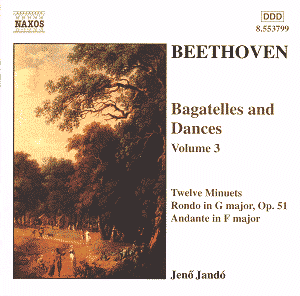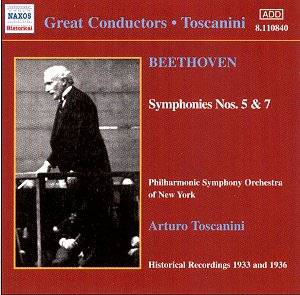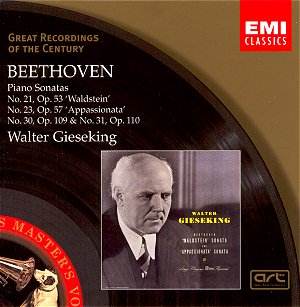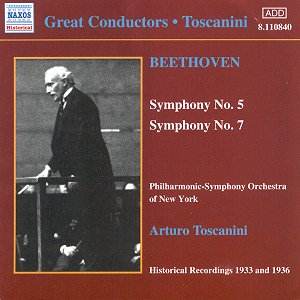 Composer: Ludwig van Beethoven (1770-1827)
Composer: Ludwig van Beethoven (1770-1827)
Works: Bagatelles and Dances, Volume 3:
Performer: Jeno Jandó (piano)
Recorded: Budapest, January 1996
Label: NAXOS 8.553799 [55:46]
In Jeno Jandó’s latest contribution to Beethoven’s lesser-known piano repertoire, Bagatelles and Dances, Volume 3, the pianist navigates a rich tapestry of both charm and wit woven into the fabric of these delightful miniatures. The collection, though modest in scale, offers a glimpse into the playful and sometimes profound world of Beethoven’s keyboard works, which, while often overshadowed by the grandiosity of his sonatas, provide invaluable insight into his artistic evolution.
The disc opens with the exuberant Rondo a Capriccio in C major, Op. 129, popularly known as Rage over a Lost Penny. Here, Jandó captures the piece’s inherent mockery and fervent spirit, deploying a brisk tempo that highlights the capricious nature of the work. Beethoven’s original title, suggesting a Hungarian style, is deftly interpreted with an invigorating ferocity that emphasizes the playful contrasts within the music. Jandó’s phrasing reveals a keen understanding of the rhetorical gestures at play, particularly in the recurring theme that oscillates between joyous abandon and comic exasperation.
Transitioning to the Andante in F major (Andante favori), WoO 57, Jandó reveals his lyrical sensibility. This piece, originally intended as the slow movement for the Waldstein Sonata, is imbued with a sense of introspective elegance. Jandó articulates the melodic line with a fluidity that resonates deeply, employing a subtle rubato that maintains the piece’s lyrical integrity while inviting moments of poignant reflection. It is a testament to Jandó’s interpretive skill that he can navigate the delicate balance between expressiveness and restraint.
In the Rondo in C major, Op. 51, No. 1, Jandó explores a song-like theme reminiscent of Schubert, presenting it through a series of variations that unveil the composer’s inventive genius. The thematic material is treated with a variety of textures and colors, and Jandó’s nuanced touch allows each variation to emerge distinctly. The subsequent Rondo in G major, Op. 51, No. 2, follows a similar formal structure but features a more brilliant and flowing theme. Jandó’s performance here is marked by technical assurance and an understanding of Beethoven’s harmonic explorations, particularly in the deft way he navigates the dazzling passages that serve as variations.
The Rondo in A major, WoO 44, stands as an early work marked by simplicity of development. Jandó’s interpretation shines a light on its charming innocence, which, while less complex than its predecessors, allows a refreshing contrast to the more intricate pieces surrounding it. The joyfulness is palpable, and Jandó’s approach invites listeners to appreciate Beethoven’s early style without over embellishment.
The latter half of the disc features two German Dances and a set of twelve minuets, WoO 7, works that, while frequently dismissed as mere trifles, reveal Beethoven’s engagement with the social dance culture of his time. Jandó’s interpretations eschew monotony—often a pitfall for performances of such music—by implementing judicious tempo variations and thoughtful phrasing. The dances resonate with the vitality of the Viennese ballrooms, and Jandó’s palpable enjoyment of the music breathes life into these works. Each minuet, inherently repetitive in structure, benefits from Jandó’s attentive articulation, which maintains listener interest through subtle shifts in dynamics and tempo.
The recording quality by NAXOS is commendable; the piano sound is clear and well-balanced, allowing the full spectrum of Jandó’s dynamic range to shine through. The acoustics of the Budapest studio contribute to a warm resonance that complements the intimate nature of the repertoire. This clarity is particularly effective in capturing the nuances of Jandó’s phrasing, enhancing the listener’s experience.
In conclusion, Jeno Jandó’s Bagatelles and Dances, Volume 3 is a well-considered addition to the exploration of Beethoven’s piano works. His interpretive choices—marked by a blend of technical finesse and expressive depth—serve to illuminate the charm and intricacy of these compositions. While they may occupy a lesser position in the Beethoven canon, the performances here affirm that there is no such thing as minor works when approached with the care and insight that Jandó provides. This disc will undoubtedly appeal to those looking to deepen their appreciation of Beethoven’s lesser-known gems.



